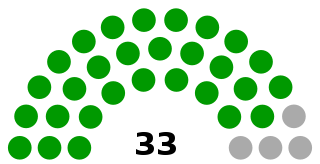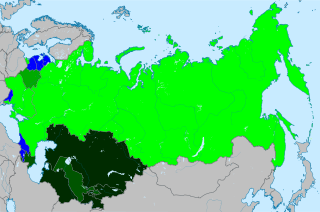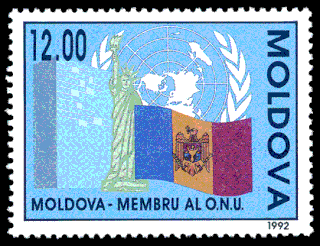Related Research Articles
The history of Moldova can be traced to the 1350s, when the Principality of Moldavia, the medieval precursor of modern Moldova and Romania, was founded. The principality was a vassal of the Ottoman Empire from 1538 until the 19th century. In 1812, following one of several Russian–Turkish wars, the eastern half of the principality, Bessarabia, was annexed by the Russian Empire. In 1918, Bessarabia briefly became independent as the Moldavian Democratic Republic and, following the decision of the Parliament, united with Romania. During the Second World War it was occupied by the Soviet Union which reclaimed it from Romania. It joined the Union as the Moldavian ASSR, until the dissolution of the USSR. In 1991 the country declared independence as the Republic of Moldova.

The politics of Moldova take place in a framework of a parliamentary representative democratic republic, wherein the prime minister is the head of the Government of Moldova, and a multi-party system. The President of Moldova has no important powers. The government exercises executive power while the legislative power is vested in the Parliament. The judiciary is independent of the executive and the legislature. The position of the breakaway region of Transnistria, relations with Romania and with Russia, and integration into the EU dominate political discussions.

After achieving independence from the Soviet Union, the Republic of Moldova established relations with other European countries. A course for European Union integration and neutrality define the country's foreign policy guidelines.

Transnistria, officially known as the Pridnestrovian Moldavian Republic (PMR), is a breakaway state internationally recognized as part of Moldova. Transnistria controls most of the narrow strip of land between the Dniester river and the Moldova–Ukraine border, as well as some land on the other side of the river's bank. Its capital and largest city is Tiraspol. Transnistria is officially designated by the Republic of Moldova as the Administrative-Territorial Units of the Left Bank of the Dniester or as Stînga Nistrului.

Vladimir Voronin is a Moldovan politician. He was the third President of Moldova from 2001 until 2009 and has been the leader of the Party of Communists of Moldova (PCRM) since 1994. He was Europe's first democratically elected communist party head of state after the dissolution of the Eastern Bloc.

The politics of Transnistria, a de facto independent state situated de jure within the Republic of Moldova in Eastern Europe, take place in a framework of a semi-presidential republic, whereby the President of Transnistria is head of state and the Prime Minister of Transnistria is head of government. Executive power is exercised by the government. Legislative power is vested in both the government and parliament. Formally, Transnistria has a multi-party system and a unicameral parliament, called the Supreme Council. The president is elected by popular vote. The latest parliamentary elections were held in November 2020.

The Transnistrian War was an armed conflict that broke out on 2 November 1990 in Dubăsari between pro-Transnistria forces, including the Transnistrian Republican Guard, militia and neo-Cossack units, which were supported by elements of the Russian 14th Army, and pro-Moldovan forces, including Moldovan troops and police.

The Supreme Council of the Pridnestrovian Moldavian Republic is the parliament of Transnistria. The unicameral legislature consists of 33 seats, all of which are determined by single mandate constituencies. It is headed by a chairman.

Moldovenism is a term used to describe the political support and promotion of a Moldovan identity and culture, including a Moldovan language, independent from those of any other ethnic group, the Romanians in particular. It is primarily used as a pejorative by the opponents of such ideas as part of the wider controversy over ethnic and linguistic identity in Moldova.

An independence referendum was held in Montenegro on 21 May 2006. It was approved by 55.5% of voters, narrowly passing the 55% threshold. By 23 May preliminary referendum results were recognized by all five permanent members of the United Nations Security Council, suggesting widespread international recognition if Montenegro were to become formally independent. On 31 May the referendum commission officially confirmed the results of the referendum, verifying that 55.5% of the population of Montenegrin voters had voted in favor of independence. Because voters met the controversial threshold requirement of 55% approval, the referendum was incorporated into a declaration of independence during a special parliamentary session on 31 May. The Assembly of the Republic of Montenegro made a formal Declaration of Independence on Saturday 3 June.

The Transnistria conflict is an ongoing frozen conflict between Moldova and the unrecognized state of Transnistria. Its most active phase was the Transnistria War. There have been several attempts to resolve the conflict, although none have been successful. The conflict may be considered as having started on 2 September 1990, when Transnistria made a formal sovereignty declaration from Moldova.
The 2006 Transnistrian customs crisis started on March 3, 2006, when Ukraine imposed new customs regulations on its border with Moldova on the Transnistrian region by declaring that it will only import goods from Transnistria with documents processed by Moldovan customs offices, as part of the implementation of a joint customs protocol between Ukraine and Moldova on December 30, 2005.

The state of affairs with human rights in Transnistria has been criticized by several governments and international organizations. The Republic of Moldova, and other states and non-governmental organizations (NGOs) claim that the government of Transnistria is authoritarian and has a record of arbitrary arrest and torture.

A double referendum was held in Transnistria on 17 September 2006. Voters were asked whether they approved of the possibility of renouncing independence and integration with Moldova, or alternatively independence and a possible future integration into the Russian Federation.

The Popular Front of Moldova was a political movement in the Moldavian SSR, one of the 15 union republics of the former Soviet Union, and in the newly independent Republic of Moldova. Formally, the Front existed from 1989 to 1992. It was the successor to the Democratic Movement of Moldova, and was succeeded by the Christian Democratic Popular Front and ultimately by the Christian-Democratic People's Party.

Modern Moldova-Romania relations emerged after the Republic of Moldova gained independence from the Soviet Union in 1991. Pan-Romanianism has been a consistent part of Moldovan politics, and was adopted in the Popular Front of Moldova's platform in 1992. The official language of Moldova is Romanian. The peoples of the two countries share common traditions and folklore, including a common name for the monetary unit – the leu. At present, relations between the two states are exceptionally friendly, especially on account of the pro-Romanian administration of Maia Sandu in Moldova.

The Agrarian Party of Moldova, formerly the Democratic Agrarian Party of Moldova, is a Moldovan political party that was prominent from 1991 to 1998. Governing for most of this period, the party represented a large centrist multi-ethnic bloc led by former collective farm chairmen and village mayors. These reformed Communists were motivated more by patronage than ideology and committed to maintaining their positions of power in the privatised agricultural and agro-industrial sector. To its right stood the pan-Romanians of the Popular Front, and to its left, the Socialists and later the Communists.

A referendum on the future of the Soviet Union was held on 17 March 1991 across the Soviet Union. It was the only national referendum in the history of the Soviet Union, although it was boycotted by authorities in six of the fifteen Soviet republics.

The independence of Moldova was officially recognized on 2 March 1992, when Moldova gained membership of the United Nations. The nation had declared its independence from the Soviet Union on 27 August 1991, and was a co-founder of the post-Soviet Commonwealth of Independent States. Moldova became fully independent from the Soviet Union that December, and joined the United Nations three months later.

The following is timeline of the History of independent Moldova which started after the independence of Moldova.
References
- ↑ 4th Congress of UMP [ permanent dead link ] (April 24, 2006)
- ↑ Statements of the 4th UMP Congress [ permanent dead link ] (April 24, 2006)
- ↑ Union of Moldovans organised the participation of Transnistrians at Moldovan elections Archived March 13, 2007, at the Wayback Machine
- ↑ www.e-democracy.md Archived March 11, 2016, at the Wayback Machine
- ↑ СОЮЗ МОЛДАВАН ПРИДНЕСТРОВЬЯ ПРИЗВАЛ МОЛДОВУ ПРИСТУПИТЬ К ПРОЦЕДУРЕ ПРИЗНАНИЯ ПМР КАК СУВЕРЕННОГО, НЕЗАВИСИМОГО ГОСУДАРСТВА Archived February 5, 2012, at the Wayback Machine